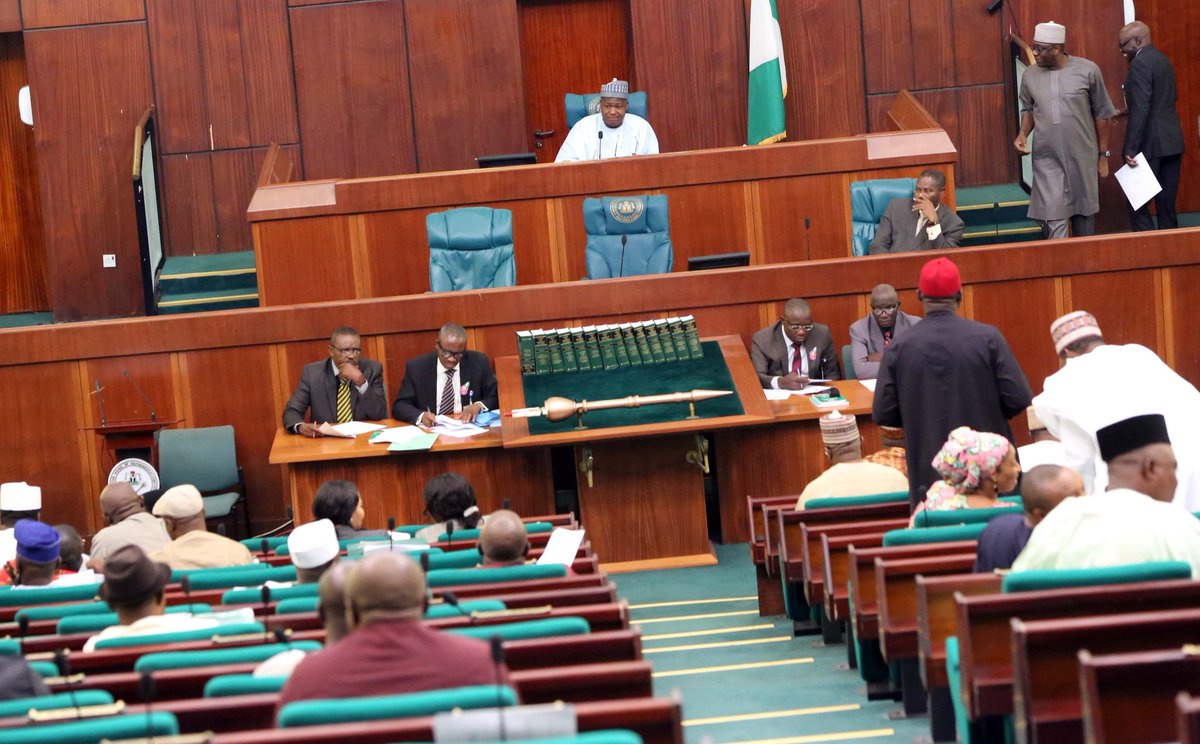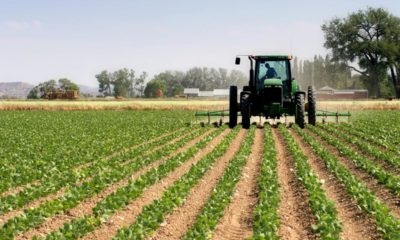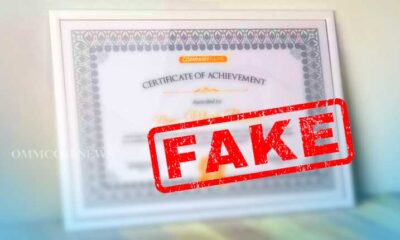Economy
Reps Indict NNPC, NPA, Others Over Unremitted FG Revenues
Published
6 years agoon

- Reps Indict NNPC, NPA, Others Over Unremitted FG Revenues
The House of Representatives has accused Federal Government’s ministries, departments and agencies of failing to follow the Treasury Single Account policy, leading to revenue leakages.
The House said it had discovered that over $900m was still “being held” by the MDAs outside the TSA.
Adopting the report by the Ad Hoc Committee on the Need to Ascertain the Proceeds of the TSA to Enhance Transparency, Accountability and Good Governance, the House indicted the Nigerian National Petroleum Corporation, the Nigerian Ports Authority, the Federal Inland Revenue Service, the Nigeria Customs Service, ministries and banks of various infractions.
All the 20 recommendations by the panel were unanimously approved by the House, including that the Ministry of Finance, the Office of the Accountant-General of the Federation and the Central Bank of Nigeria should intensify efforts to enforce full implementation and compliance with the TSA policy by all the MDAs.
While asking that the MDAs who had violated the TSA policy be sanctioned accordingly, the lawmakers ordered that the Ministry of Finance and OAGF “should be directed to publish, sanction/prosecute with immediate effect all MDAs, private persons, private organisations as well as banks, where FGN funds are hidden based on the discoveries made in the report of the consultants engaged by the OAGF and review the compliance with the TSA.”
They said applications for exemptions/waivers must follow the guidelines on TSA implementation and duly approved and signed by the President only.
The lawmakers said the Ministry of Environment’s HYPREP Account in Stanbic IBTC Bank Plc should be immediately frozen and full investigations on the status of the account should be conducted.
They said “the issues bordering on the Nigerian Ports Authority fund totalling €6,626,429.59 seized by the Economic and Financial Crimes Commission should be resolved immediately and the funds released to the appropriate owner. The EFCC should be informed in writing to immediately refund the same amount into the TSA account with the CBN.”
The NNPC was asked to make full disclosures on the nature and status of the fund held in the NNPC Pension Fund Limited domiciled in Aso Savings and Loans Plc and Unity Bank.
It was also resolved that “the Ministry of Finance, the OAGF and the Revenue Mobilisation, Allocation and Fiscal Commission should make a definite and appropriate categorisation of the Brass LNG dividends as a federation account item or as an independent revenue of the Federal Government; that subsequent funding and expenditure of the Brass LNG project be done based on approved budgetary provisions by Appropriations Acts and the funding shall be done through the FAAC/CRF Account.
“That the revenue collection arrangement entered into by the Industrial Training Fund with Puzzle Technologies Limited be suspended and the Ministry of Finance and the OAGF should immediately conduct an investigation into the circumstance of the arrangement.
“That there should be an immediate takeover of the assets used for the asset swap for Aso Savings & Loans Plc’s debt owed various MDAs. The Federal Ministry of Finance and the OAGF should be communicated to immediately inform the affected MDAs to take advantage of the offer.”
The report presented by the Chairman of the committee, Mr Danduram Abubakar, read, “During the course of investigations with various stakeholders, overwhelming discoveries were made. It was observed (that) funds belonging to the Federal Government to the tune of billions of naira and hundreds of millions of dollars were operated outside the TSA by the MDAs in collaboration with the banks.
“After the meeting with Deposit Money Banks, the Central Bank of Nigeria, the Office of the Accountant-General of the Federation, the Office of the Auditor-General of the Federation and the Nigerian National Petroleum Corporation on August 15, 2017, the committee discovered that over $900m is still being held outside the TSA.
“While some banks fully complied with the directive of the ad hoc committee by remitting these funds into the TSA, it is worthy of note that the sum of about $995.71m was still held outside the TSA by some other banks. This sum of $995.71m includes the principal deposit and the accrued interest on the deposit. Also discovered was an amount of N1.207bn and €23,704.01.”
The House accused the NNPC of extra-budgetary spending as the committee said from the information submitted by the corporation, Brass LNG received an appropriation of $511.60m while the actual release was $461.54m during 2012-2017 fiscal years.
The panel said, “The Appropriation Acts 2012-2017 depicted $550.33m for the Brass LNG project. But it is very important to note some key observations on the table above: The total appropriation is $511.60m, according to the NNPC. The actual funding for the Brass LNG project from 2012 to 2017 stood at $461.54m. The unutilised portion is $331.72m. The NNPC stated unrealised balance with the DMBs being $708.29m.”
The committee observed that some MDAS claimed to have obtained a presidential exemption to operate certain accounts outside the TSA policy.
It said, “In the case of NNPC, the committee insisted to sight the purported exemption letter. However, to the dismay of committee, the letter was only conveying the approval of the President signed by an assistant director. As for the former, the letter could not be produced as of now, May 9, 2019.”
The lawmakers also accused NNPC of financial operations outside the TSA, saying, “The balance in this (CBN Joint Venture) account as reported by the NNPC, dated 30th October, 2017, stood at $188,900,383.49. These are the various accounts classified as accounts still not being moved to TSA by CBN, DMBs account.
“The committee discovered three accounts held by the NNPC in Aso Savings and Loans PLC and Unity Bank PLC. The accounts include two placement accounts called NNPC PFL Placement Deposit and the third account called NNPC Pension Fund account. The total balance in these accounts as of August 27, 2017, stood at N1, 079,444,746.49.
“The committee also made another startling discovery of a fund held in another DMB by the Federal Ministry of Environment; Hydrocarbon Pollution Remediation Programme called FME HYPREP Account. The balance in this account as of September, 2018, stood at N1.1bn and $4.9m domiciled in Stanbic IBTC Bank.
“However, the committee had written to the Minister of Environment for a status report on this account and also for the minister to appear before the committee to make clarifications in respect of the account in contention. To the dismay of the committee, the minister neither made any submission nor made any appearance.”
The NPA was also indicted by the panel, which said the authority’s funds were trapped by Intels.
“Further investigations revealed to the committee (that) a whopping value of $569,162,083.80 as Intels’ obligation to the NPA. On the other hand, Intels’ submitted to the ad hoc committee in 2017 an outstanding obligation to the NPA as $862.2m. The difference from the two submissions might have been after Intels have made additional payment to the NPA after the NPA submission to the committee,” the report read.
The lawmakers said the documents submitted by the OAGF and the CBN showed that between January and September 2016, the FIRS collected N32, 689,825,757.91 while Customs collected N975, 923,050.49.
The panel said, “The figures above clearly cannot include the Federal Government’s share of Federal Account Allocation Committee revenue collected by these core revenue generating agencies and may just be their independent revenue component.
“Projected FGN share of Company Income Tax alone for Fiscal 2016 is N867.46bn, which implies a projected collection of about N650.59bn as of 30th September 2016. Projected FGN share of Customs’ collections is N326.44bn, which implies a projected collection of about N244.83bn as of 30th September 2016. These figures are clearly much more than what was submitted by the CBN and OAGF.
“As a further illustration, official Customs’ revenue as of 30th September 2016, as published by the Nigeria Customs Service, shows a total collection of N647, 295,101,275.51. It is clear, therefore, to the committee that the submissions made by the executives to the committee did not include the FGN share of FAAC collections from these two revenue generating agencies.”
Is the CEO and Founder of Investors King Limited. He is a seasoned foreign exchange research analyst and a published author on Yahoo Finance, Business Insider, Nasdaq, Entrepreneur.com, Investorplace, and other prominent platforms. With over two decades of experience in global financial markets, Olukoya is well-recognized in the industry.

You may like
-


Federal Government Tackles Food Insecurity with Farm Equipment for Katsina Farmers
-


FG Disburses N5.3 Billion in Intervention Scheme to Alleviate Economic Hardship
-


FG, World Bank Agrees $700m Deal To Boost Rural Agriculture, Others
-


FG Allocates N700 Billion to Provide Free Electricity Meters Nationwide
-


Federal Government Unveils N198 Billion Loan Scheme to Empower Nigerian Entrepreneurs
-


FG Cracks Down on Fake Certificates: Over 22,000 Civil Servants Under Scrutiny







